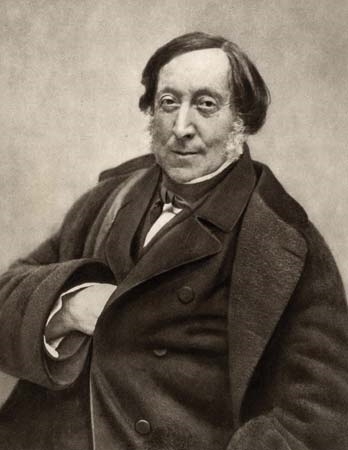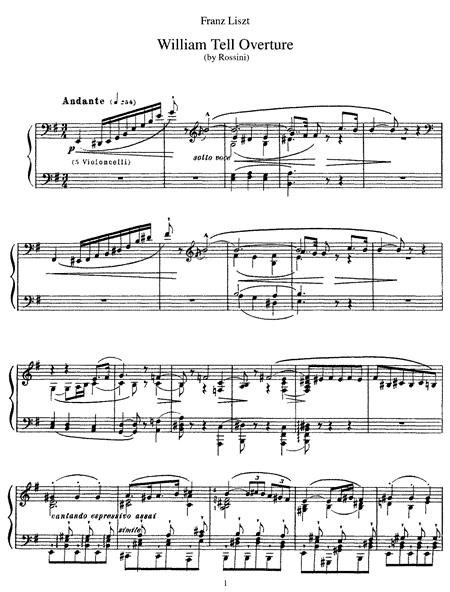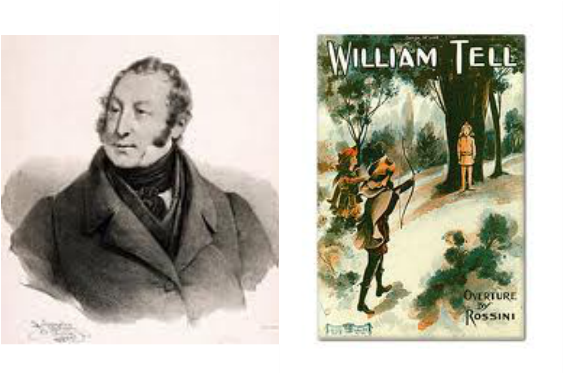 |
| Gioacchino Rossini (http://www.britannica.com/biography/Gioachino-Rossini) |
"Never take a situation to heart, he believed, when you can take it in hand. Having discovered a talent for creating sparkling one-act farces, he planned to make a fortune and to provide for his parents"(Di Renzo). Gioacchino Rossini used his optimistic attitude and his talent to work hard and achieve a happy lifestyle and produce unique operas. Gioacchino Rossini was a talented composer who is well known for conducting his 39th opera, "William Tell" and his more comical style in his operas. He was born on February 29, 1792 in Pesaro and died on November 13, 1868. He constantly traveled to conduct his operas and wrote multiple operas every year. He was particularly popular for his line of operas in Naples and Paris, being called an idol of the neapolitans. He was introduced to music at a young age, learning how to sing and play the violin. He even composed his first opera at the age of 14. A hero must possess optimism and they must be talented. They must be optimistic because without optimism, you cannot solve problems or get through rough patches if you can't see the positive parts of a situation. They must be talented because a talent is what separates them from other heroes and makes them unique. Gioacchino Rossini is a hero because he possessed both optimism and talent, which he has shown throughout his life as a successful composer.
 |
| William Tell sheet music (http://imslp.org/wiki/Guillaume_Tell_(Rossini,_Gio ()) |
Rossini is considered a hero because he is talented. He completed many pieces of music throughout his lifetime, with some of his operas still playing to this day. "Success came quickly to the young composer. He wrote rapidly and fluently, in a style pleasing to singers and audiences alike. La pietra del paragone was staged to great acclaim at La Scala in Milan in 1812; Tancredi became a genuine international hit following its premiere in Venice the following year. Operas flowed from his pen at the rate of three or four a year"(Gioacchino Rossini). Not only was he great at composing music and operas quickly and successfully, but his unique style was very appealing to his audience and the people who performed in his operas. Rossini was able to complete many operas at a young age and became successful from working hard to produce and conduct his operas. It was also apparent that his talent for producing music blossomed when he was at a younger age. "Though a lazy student, the young Rossini found it easy to learn to sing and play. At the age of 14 he entered Bologna's Philharmonic School (now the G.B. Martini State Conservatory of Music) and composed his first opera seria-Demetrio e Polibio (1806; staged in 1812)-for the Mombelli, a family of singers. At 15 he had learned the violin, horn, and harpsichord and had often sung in public, even in the theatre, to earn some money"(Jean-Louis). Gioacchino Rossini was a fast learner and applied his knowledge and talents to what he wanted to do in the future; compose music. Because of his exposure to music when he was younger, he was able to explore his ability of playing music and eventually write his own music. Rossini's talents make him a hero because with them, he was able to influence and change the music world with his unique operas.
Gioacchino Rossini's never-ending optimism makes him a hero. Rossini started to lose his creativity as he got older but still remained happy. "He retained a lively interest in the musical scene, composed occasional cantatas, such religious works as the Stabat Mater and Petite Messe solennelle of 1864, and several hundred small "album" pieces for piano, voice and piano, and various instruments, but he never again attempted a work for the stage. He was a wealthy man, charming and witty, much in demand socially, and comfortable even with those men whose ideas about music were in conflict with his own"(Gioacchino Rossini). Even with all the negative pressure from the public he was facing, he didn't give into it and and instead continued working at his own comfortable pace. He also chose to blissfully ignore any conflict he might have had with other composers about his own style of music, and reacted positively. The way he acted around others also shows how bad situations can always have positive sides to them. "After Wilhelm Tell, Rossini was inactive, depressed, fat and had health problems, but could all of a sudden enjoy life with friends. Felix Mendelssohn met him in Paris and described him as 'fat but in excellent spirit - I know nobody who is as entertaining as Rossini - and we only laughed'"(Rossner). Others can see that Rossini was suffering from health problems, but he instead celebrated after working hard to please others with his music. He was able to look on the brighter side of retiring from stepping on stage to conduct his operas. Gioacchino Rossini is able to look beyond the negative thoughts and see good in a situation that seems bad, showing that there can always be a good side to a bad situation.
 |
| William Tell (http://juniorcertmusica.weebly.com/william-tell-ov ()) |
Gioacchino Rossini is a hero because he is both talented and optimistic and applied those characteristics to being an amazing composer."For posterity we can only be grateful for all the inspiring music that Rossini produced. Whatever he touched became music with an electrifying and elegant touch, which seemed to come so easy that music literally flowed out of his pen. Brilliant, perhaps superficial, but irresistible and always elegant"(Rossner). Rossini inspired people by using his talents and created his own unique style when it came to conducting operas, all while making it enjoyable for audiences and the singers as well. Rossini has also influenced other composers during the romantic era. Everyone had expected a lot out of Rossini, and he worked hard to please them all in a short period of time. When times got rough for Rossini, he did not think negatively and instead thought about ways to solve his predicaments or looked at the brighter side of it all.
Works Consulted
"Classical Net - Basic Repertoire List - Rossini." Classical Net. Classical Net, 2016. Web. 05
May 2016. .
Di Renzo, Anthony. "Allegro Con Brio." River Styx 73 (2006): 68-88. Literary Reference Center.
Web. 5 May 2016
"Gioacchino Rossini." Encyclopedia of World Biography. Detroit: Gale, 1998. Student Resources
in Context. Web. 6 May 2016.
Jean-Louis, Caussou. "Rossini, Gioachino." Britannica Biographies (2012): 1. History Reference
Center. Web. 6 May 2016.
Rossner, Stephan. "Gioacchino Rossini (1792-1868)." Obesity Reviews 13.1 (2012): 92-93.
Academic Search Premier. Web. 6 May 2016.
Page created on 5/20/2016 12:00:00 AM
Last edited 11/17/2018 4:12:43 PM
